Going to join your first job as a fresher? You must have to read this article as this article is for you, This is an exciting and nerve-wracking time, as you enter the professional world and take your first steps towards building your career.
But before you dive in headfirst, there are a few important things you should know. In this article, we’ll cover some essential tips and insights to help you navigate the world of work as a fresher.
Finding the Right Fit
Before you accept a job offer, it’s crucial to assess whether the company and role are the right fit for you. Here are a few things to consider:
Company Culture
Take some time to research the company’s values, mission, and work environment. Look for a company culture that aligns with your own values and aspirations.
Are they known for fostering a collaborative and inclusive workplace? Do they prioritize employee growth and development?
Understanding the company culture will give you a better idea of whether you’ll feel comfortable and thrive in that environment.
Job Responsibilities
Carefully review the job description to understand the specific responsibilities and requirements of the role. Ask yourself if these align with your skills and interests.
Consider the potential for growth within the role and whether it aligns with your long-term career goals. While it’s normal to start in an entry-level position, ensure that there are opportunities for advancement and learning.
Compensation and Benefits
Consider the compensation package and benefits offered by the company. While salary is an important factor, it’s equally important to evaluate the overall benefits package, including health insurance, retirement plans, paid time off, and professional development opportunities.
A comprehensive benefits package can greatly enhance your overall job satisfaction and well-being.
Personal Development
Your first job is not just about earning a paycheck; it’s also an opportunity for personal growth and development. Here are some tips to make the most of this learning experience:
Have an Open Mind
Approach your new job with an open mind and a willingness to learn. Recognize that you are starting at the beginning of your career journey and there is much to learn from your colleagues, superiors, and even your subordinates.
Embrace new challenges and be open to different perspectives and ideas and don’t lost yourself in stressful jobs.
Seek Feedback
Feedback is crucial for growth and improvement. Actively seek feedback from your colleagues and supervisors to understand areas where you can enhance your skills and performance.
Accept constructive criticism gracefully and use it as an opportunity to grow.
Earlier Post: The Best Interview Dress Code for Female
Continuous Learning
In today’s fast-paced world, it’s important to stay updated with the latest industry trends and advancements.
Take advantage of any training programs, workshops, or webinars offered by your company.
Additionally, seek out external resources such as online courses or industry publications to continuously enhance your knowledge and skills.
Building Professional Relationships
Being successful in your first job is not just about your technical skills; it also hinges on your ability to build strong professional relationships. Here are some tips to foster meaningful connections:
Networking
Network both within and outside your organization. Attend industry events, join professional associations, and leverage social media platforms such as LinkedIn to connect with peers, mentors, and industry leaders.
Networking can open doors to new opportunities and provide valuable guidance and support throughout your career.
Mentors
A mentor can be instrumental in your professional growth. Look for someone in your organization who has experience in your field and is willing to guide and support you.
A mentor can provide invaluable career advice, help you navigate challenges, and share their own wisdom and insights.
Collaboration
Embrace collaboration and teamwork. Seek opportunities to work with colleagues from different departments or teams.
Collaboration not only enhances your own learning but also allows you to contribute to the success of the organization as a whole.
Work-Life Balance
Maintaining a healthy work-life balance is crucial for your overall well-being. Here are some tips to strike the right balance:
Set Boundaries
Establish clear boundaries between your work and personal life. Identify your priorities and allocate time and energy accordingly.
Avoid consistently working late hours or sacrificing personal time for work-related tasks. Remember, a healthy work-life balance leads to greater productivity and job satisfaction.
Time Management
Develop effective time management skills to maximize your productivity. Prioritize tasks, set realistic goals, and avoid procrastination.
Break down larger projects into smaller, manageable tasks, and allocate time for breaks and self-care. Experiment with different strategies to find what works best for you.
Self-Care
Taking care of your mental and physical well-being is crucial. Find activities that help you relax and recharge, whether it’s exercising, practicing mindfulness, or pursuing hobbies.
Make self-care a priority to avoid burnout and maintain a healthy work-life balance.
Embracing Challenges
Finally, remember that your first job will come with its fair share of challenges. Embrace these challenges as opportunities for growth and learning. Be adaptable, resilient, and proactive in seeking solutions.
Remember that everyone makes mistakes, and it’s okay to ask for help when needed. Your ability to handle challenges with grace and a positive attitude will set you apart and contribute to your professional development.
Conclusion
In conclusion, starting your first job as a fresher is an exciting milestone. By carefully considering the company culture, job responsibilities, and compensation, you can find the right fit.
Focus on personal development, building professional relationships, maintaining a work-life balance, and embracing challenges.
With the right mindset and approach, your first job can be a stepping stone towards a successful and fulfilling career. Good luck on your new journey.
FAQs
How do I prepare for my first day at a new job?
Familiarize yourself with the company culture, review the dress code, and research your role. Arrive early, be open to learning, and bring a positive attitude to make a great first impression.
What workplace etiquette should I be aware of as a fresher?
Respect colleagues’ time, communicate effectively, and practice active listening. Learn the office norms, follow deadlines, and seek feedback to foster a collaborative and positive work environment.
How can I build good relationships with colleagues and superiors?
Be approachable, show genuine interest in your team’s work, and offer assistance when possible. Networking within the company can open doors for mentorship and career growth.
What skills are crucial for a successful start in the professional world?
Apart from technical skills, soft skills like communication, adaptability, and teamwork are vital. Focus on continuous learning and stay updated on industry trends to stay competitive.
How can I manage work-life balance effectively?
Prioritize tasks, set boundaries, and communicate openly with your team about workload. Striking a balance between work and personal life contributes to long-term career satisfaction.
What should I do if I face challenges or conflicts at work?
Approach challenges with a problem-solving mindset. Communicate concerns professionally, seek guidance from mentors or HR, and learn from constructive feedback to enhance your performance.






